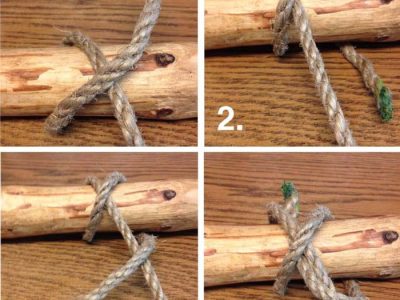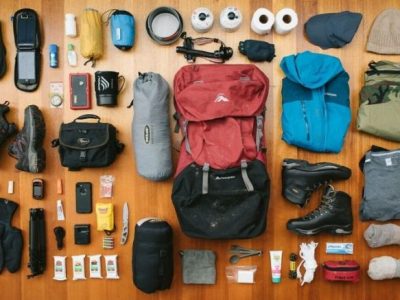Essential Camping Activities for Scouts embarks on a captivating journey into the realm of outdoor adventure, providing an indispensable guide for young explorers eager to embrace the wilderness. This comprehensive narrative delves into the intricacies of setting up camp, cooking nutritious meals, engaging in campfire activities, embarking on thrilling hikes, appreciating nature’s wonders, and prioritizing safety.
As scouts venture into the great outdoors, they will discover the importance of selecting an ideal campsite, pitching their tents with precision, and adhering to fire safety protocols. They will learn to prepare simple yet nourishing meals over a campfire, ensuring food safety and hydration.
Campfire activities, such as storytelling and stargazing, will foster camaraderie and a deeper connection with nature.
Setting Up Camp
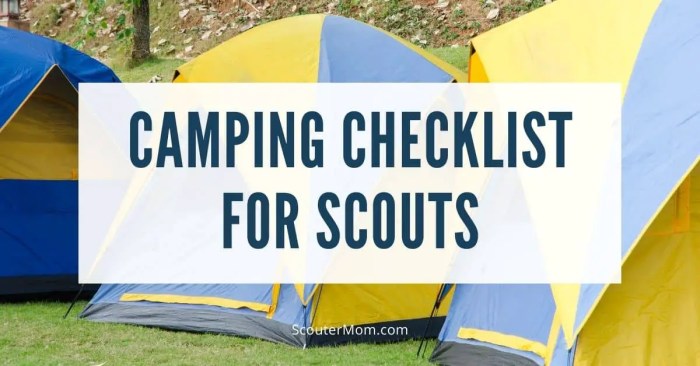
Setting up camp is a crucial aspect of any scouting expedition, ensuring a comfortable and safe shelter for the night. Selecting an appropriate campsite and pitching a tent properly are essential skills for every scout. Understanding fire safety and mastering campfire techniques are equally important for warmth, cooking, and creating a cozy ambiance.
Selecting a Campsite, Essential camping activities for scouts
- Choose a level and well-drained area away from potential hazards like fallen trees, water bodies, and steep slopes.
- Consider the proximity to water sources for cooking and drinking, but avoid areas prone to flooding.
- Look for natural windbreaks like trees or rock formations to protect the campsite from strong winds.
- Ensure there is enough space for tents, cooking, and other camp activities.
Pitching a Tent
- Clear the campsite of any debris and rocks.
- Lay out the tent footprint to protect the tent floor from moisture and dirt.
- Assemble the tent poles and insert them into the designated sleeves.
- Spread out the tent and attach it to the poles, starting with the corners.
- Secure the tent with stakes and guy lines, ensuring it is taut and stable.
- Check for any gaps or leaks in the tent fabric.
Fire Safety and Campfire Techniques
Fire is an essential part of camping, providing warmth, light, and a means to cook food. However, it must be handled with utmost caution.
- Build campfires only in designated areas or fire rings.
- Clear a perimeter around the fire to remove any flammable materials.
- Never leave a fire unattended, and extinguish it completely before leaving the campsite.
- Use dry firewood and avoid burning trash or plastics.
Mastering campfire techniques allows scouts to build different types of fires for specific purposes, such as cooking, signaling, or warmth.
Essential Tools and Gear
- Tent, sleeping bag, and sleeping pad
- Headlamp or flashlight
- Camp stove and fuel
- Cooking utensils
- Water container and purification tablets
- First aid kit
- Multi-tool or pocket knife
- Fire starter and lighter
- Whistle or signaling device
Cooking and Nutrition
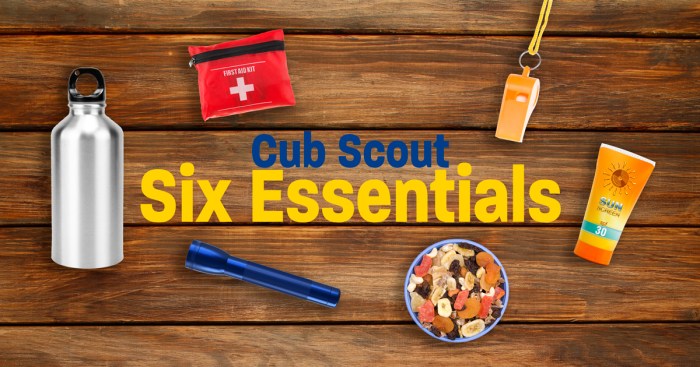
Camping offers a unique opportunity to connect with nature and enjoy the outdoors. However, it’s crucial to prioritize proper nutrition and food safety to ensure a safe and enjoyable experience.
Simple and Nutritious Campfire Meals
Campfire cooking allows for creativity and flexibility. Here are some simple and nutritious recipes to try:
- Tin Foil Dinners:Wrap your favorite protein (chicken, fish, tofu) with vegetables (potatoes, carrots, onions) in aluminum foil and cook over the fire until tender.
- Campfire Nachos:Spread tortilla chips on a campfire-safe pan, top with shredded cheese, beans, and any other desired toppings, and heat until the cheese melts.
- S’mores:A classic campfire treat, roast marshmallows over the fire and sandwich them between graham crackers with a piece of chocolate.
Food Safety and Hygiene
Maintaining proper food safety is essential when camping. Follow these guidelines:
- Wash your hands thoroughly before handling food.
- Keep raw meat and produce separate from cooked food.
- Cook food to the proper internal temperature to kill bacteria.
- Store perishable food in a cooler with ice packs.
- Dispose of waste properly to avoid attracting wildlife.
Staying Hydrated
Staying hydrated is crucial for overall health and well-being. When camping, drink plenty of water throughout the day. Avoid sugary drinks, as they can dehydrate you. If water sources are limited, consider purifying water using a water filter or boiling it.
Campfire Activities
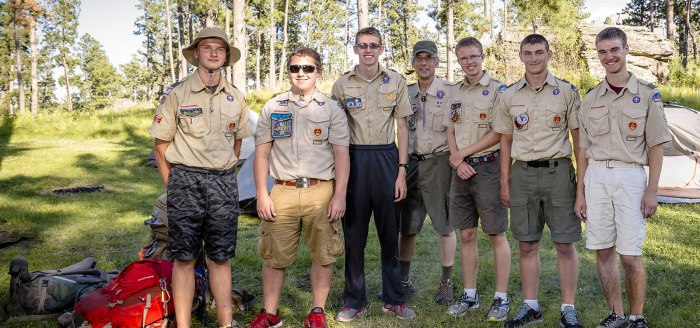
Campfires are an integral part of the scouting experience, providing opportunities for storytelling, singing, stargazing, and fostering a sense of community. Beyond entertainment, these activities play a crucial role in educating and enriching scouts.
Campfire etiquette and safety are paramount. Scouts should always respect the campfire and its surroundings, adhering to designated areas and fire safety protocols. They should be aware of the potential hazards and take necessary precautions to prevent accidents.
Storytelling
- Stories around the campfire can transport scouts to different worlds, stimulate their imaginations, and teach valuable lessons.
- Encourage scouts to share their own stories, promoting creativity and self-expression.
- Consider using storytelling as a tool for teaching history, values, or important life skills.
Singing
- Singing around the campfire creates a sense of unity and camaraderie.
- It fosters a positive and uplifting atmosphere, promoting teamwork and morale.
- Scouts can learn new songs and share their favorites, expanding their musical knowledge and appreciation.
Stargazing
- Away from the city lights, campfires offer an excellent opportunity for stargazing.
- Use star charts and apps to identify constellations and planets, sparking an interest in astronomy.
- Discuss the cultural significance of stars in different societies, broadening scouts’ cultural awareness.
Cultural Significance
Campfires have deep cultural significance in scouting traditions, symbolizing warmth, camaraderie, and a connection to nature.
- Campfires serve as a gathering place for scouts to share experiences, build relationships, and foster a sense of belonging.
- They represent a time for reflection and introspection, encouraging scouts to connect with themselves and their surroundings.
- Campfires embody the spirit of adventure and exploration, inspiring scouts to embrace new challenges and discover the world around them.
Hiking and Exploration: Essential Camping Activities For Scouts
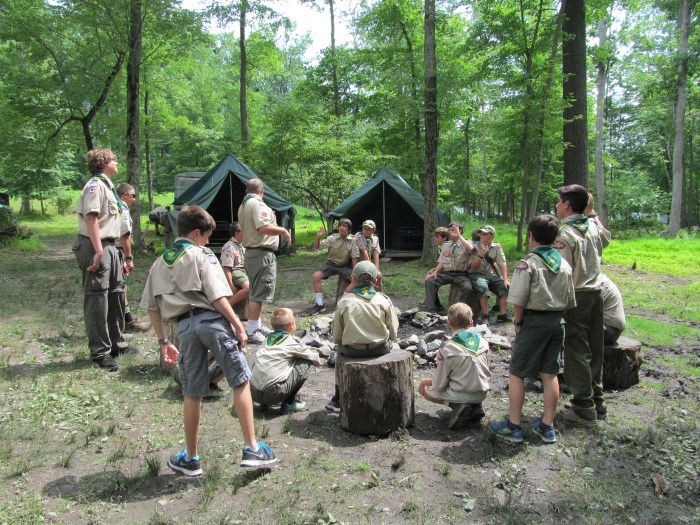
Embarking on hiking adventures during your scouting journey offers a unique opportunity to connect with nature, test your limits, and foster a deep appreciation for the environment. To ensure a safe and fulfilling experience, careful planning and preparation are essential.
This guide will equip you with the knowledge and skills to design a memorable hiking itinerary, navigate trails confidently, and embrace the wonders of the natural world.
Designing a Hiking Itinerary
Crafting a well-rounded hiking itinerary is crucial for a successful expedition. Consider the following factors:
- Trail Selection:Research and select trails that align with your group’s fitness level, interests, and time constraints. Explore scenic trails that showcase diverse landscapes, panoramic views, and historical landmarks.
- Distance and Elevation:Determine the appropriate distance and elevation gain for your group. Start with shorter, less challenging trails and gradually increase the difficulty as your fitness improves.
- Points of Interest:Identify points of interest along the trail, such as waterfalls, viewpoints, or historical sites. These landmarks can serve as motivation and provide opportunities for rest and contemplation.
- Time Allocation:Plan realistic timeframes for hiking, breaks, and exploration. Allow ample time to enjoy the scenery, take photographs, and savor the experience.
Navigating Trails and Respecting the Environment
Navigating trails safely and respectfully is essential for a responsible hiking experience:
- Stay on Designated Trails:Adhere to marked trails to avoid disturbing fragile ecosystems and minimize your impact on the environment.
- Be Aware of Wildlife:Observe wildlife from a distance and avoid approaching or feeding animals. Respect their natural habitats and give them space.
- Pack It In, Pack It Out:Carry out all trash and waste to preserve the pristine beauty of the trails. Leave no trace of your presence and promote a clean and healthy environment.
Essential Gear and Preparation
Proper gear and preparation are vital for a comfortable and safe hiking experience:
- Footwear:Invest in sturdy, supportive hiking boots that provide ankle protection and traction. Break in your boots before your hike to prevent blisters.
- Clothing:Wear breathable, moisture-wicking clothing in layers to adjust to changing temperatures. Consider weather conditions and pack appropriate rain gear.
- Hydration:Carry plenty of water and replenish regularly, especially in hot or humid conditions. Consider using a hydration pack for easy access.
Nature Appreciation

Nature Appreciation is a fundamental aspect of camping for scouts. It involves understanding and respecting the natural environment, fostering a sense of connection with the outdoors, and practicing responsible camping habits. By learning about Leave No Trace principles, identifying local flora and fauna, and immersing themselves in the natural surroundings, scouts develop a deep appreciation for the beauty and fragility of the wilderness.
Leave No Trace Principles
Leave No Trace is a set of guidelines that help minimize the impact of human activities on the natural environment. These principles include:
- Plan ahead and prepare
- Travel and camp on durable surfaces
- Dispose of waste properly
- Leave what you find
- Minimize campfire impacts
- Respect wildlife
By following these principles, scouts can help preserve the natural environment for future generations.
Identifying Common Plants and Animals
Identifying common plants and animals in the camping area is an important part of nature appreciation. This knowledge allows scouts to understand the ecosystem they are in and to appreciate the diversity of life that exists within it. Some common plants and animals to look for include:
- Trees: Oak, maple, pine, birch
- Shrubs: Rhododendron, mountain laurel, blueberry
- Wildflowers: Daisy, dandelion, buttercup
- Birds: Robin, sparrow, cardinal
- Mammals: Deer, rabbit, squirrel
By learning to identify these plants and animals, scouts can gain a deeper understanding of the natural world.
Benefits of Nature Immersion
Spending time in nature has numerous benefits for scouts, including:
- Improved physical health
- Reduced stress and anxiety
- Enhanced cognitive function
- Increased creativity
- Foster a sense of connection with the outdoors
By immersing themselves in nature, scouts can improve their overall well-being and develop a lifelong love of the outdoors.
Safety and First Aid

Ensuring the well-being of scouts is paramount in any camping excursion. A comprehensive safety plan and first aid preparedness are essential to minimize risks and respond effectively to emergencies.
Emergency Preparedness
Establish a clear emergency plan that Artikels potential hazards, evacuation procedures, and emergency contacts. Involve scouts in developing the plan to foster their awareness and responsibility.
- Identify potential hazards: poisonous plants, wildlife, weather conditions, water hazards
- Establish evacuation routes and designate meeting points
- Provide emergency contact information (parents, camp leaders, local authorities)
- Review and practice the plan with scouts before the trip
First Aid Supplies
Assemble a comprehensive first aid kit that includes essential supplies for treating common injuries and ailments.
- Antiseptic wipes or solution
- Bandages (various sizes)
- Gauze pads
- Antihistamines
- Insect repellent
- Sunscreen
- Whistle or other signaling device
li>Pain relievers (e.g., ibuprofen)
First Aid Techniques
Provide training on basic first aid techniques, such as wound care, CPR, and splinting. Empower scouts with the knowledge and skills to respond to emergencies.
- Wound care: cleaning and dressing wounds
- CPR: performing chest compressions and rescue breathing
- Splinting: immobilizing injured limbs
- Recognizing and treating common ailments (e.g., insect bites, sunburn, dehydration)
Weather Awareness
Monitor weather conditions regularly and take precautions to avoid accidents. Discuss weather safety guidelines and encourage scouts to be observant of their surroundings.
- Check weather forecasts before and during the trip
- Identify shelter options in case of inclement weather
- Avoid hiking in thunderstorms or during heavy rain
- Wear appropriate clothing and footwear for weather conditions
Wrap-Up
Through Essential Camping Activities for Scouts, young adventurers will gain invaluable knowledge and skills that will empower them to navigate the wilderness with confidence and respect. By embracing the principles of Leave No Trace, they will become responsible stewards of the environment, preserving its beauty for generations to come.
This comprehensive guide serves as a testament to the transformative power of camping, fostering a lifelong love for the outdoors and instilling a deep appreciation for the wonders of nature.
FAQ Compilation
What are the essential tools for setting up a comfortable campsite?
A tent, sleeping bag, sleeping pad, camp stove, cooking utensils, lantern, and multi-tool are essential for a comfortable camping experience.
How can scouts stay hydrated while hiking?
Scouts should carry a reusable water bottle and fill it up at designated water sources along the trail. They should also drink water regularly, even if they don’t feel thirsty.
What are some fun and educational campfire activities?
Storytelling, singing, stargazing, and skits are all engaging and educational campfire activities that can foster camaraderie and a deeper connection with nature.

